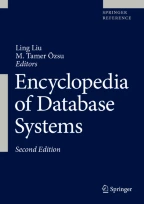Definition
The term Armstrong axioms refers to the sound and complete set of inference rules or axioms, introduced by William W. Armstrong [2], that is used to test logical implication of functional dependencies.
Given a relation schema R[U] and a set of functional dependencies Σ over attributes in U, a functional dependency f is logically implied by Σ, denoted by Σ⊧f, if for every instance I of R satisfying all functional dependencies in Σ, I satisfies f. The set of all functional dependencies implied by Σ is called the closure of Σ, denoted by Σ+.
Key Points
Armstrong axioms consist of the following three rules:
-
Reflexivity: If Y ⊆ X, then X → Y.
-
Augmentation: If X → Y , then XZ → YZ.
-
Transitivity: If X → Y and Y → Z, then X → Z.
Note that in the above rules XZ refers to the union of two attribute sets X and Z. Armstrong axioms are sound and complete: a functional dependency f is derivable from a set of functional dependencies Σ by applying the axioms if and only if Σ⊧f (refer to [1]...
Access this chapter
Tax calculation will be finalised at checkout
Purchases are for personal use only
Recommended Reading
Abiteboul S, Hull R, Vianu V. Foundations of databases. Reading: Addison-Wesley; 1995.
Armstrong W. Dependency structures of data base relationships. In: Proceedings of the IFIP Congress; 1974.
Author information
Authors and Affiliations
Corresponding author
Editor information
Editors and Affiliations
Section Editor information
Rights and permissions
Copyright information
© 2018 Springer Science+Business Media, LLC, part of Springer Nature
About this entry
Cite this entry
Kolahi, S. (2018). Armstrong Axioms. In: Liu, L., Özsu, M.T. (eds) Encyclopedia of Database Systems. Springer, New York, NY. https://doi.org/10.1007/978-1-4614-8265-9_1554
Download citation
DOI: https://doi.org/10.1007/978-1-4614-8265-9_1554
Published:
Publisher Name: Springer, New York, NY
Print ISBN: 978-1-4614-8266-6
Online ISBN: 978-1-4614-8265-9
eBook Packages: Computer ScienceReference Module Computer Science and Engineering
